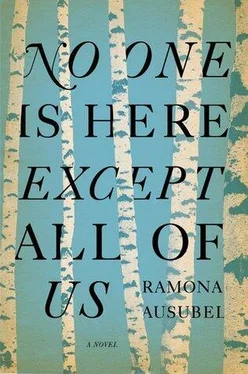“This letter is for me,” I said, holding it up. “Am I alive?
“This letter is for me!” I yelled as loud as I could, loud enough that my throat hurt. “Nobody is here! The Beautiful Baby is dead! Solomon is saved! I went northeast! The world is full of trains! Have I been gone a hundred years? Igor has become a very, very fast swimmer!”
I looked at the letter again, tore my name off— Dear L —and shredded it into a fine snow. “You left me completely alone!” I screamed to Igor. “Our boys are gone. What am I doing here? Why am I not dead?” I threw the snow of my name up into the air. “What am I going to do now?”
I listened, but heard no one answer. I put the bag of feathers down on a dry shelf and waved the muddy handkerchief and the letter in surrender. I tossed some chicken bones up like confetti and they splashed down, a sad, sinking music.
On the back of the note with a pencil that floated beneath a desk, I wrote:
Dear I,
Why is everyone always leaving each other? I almost remember who you are, but I don’t remember who I am. Do you?
Love, L
“Take me away! I’m yours!” I yelled. “I’m ready to die here!” The temple’s dumb eyes stared past me, did not acknowledge me or wink in camaraderie. The trees outside did not wave their branches.
Even though it might have been a relief to see a group of men in tall black boots come out of the fields and take me away, they did not. No one arrested me or shot me in the chest or dragged me away by my feet. No one whispered in my ear or brushed my hair. No one told me to be careful since I was going to be a mother for the third time. No one sat down nearby and opened a newspaper. No one ate an apricot and spit the pit at my feet. No one blew his nose or scratched his cheek or sighed. In a world filled with millions of people, I was left absolutely alone.
I looked at the pool around me. “Will I be a very fast swimmer like my husband?” I asked it. “Is that what I’m supposed to find out?”
The surface was a shimmering thing. Above: air; objects that used to matter; the stars; the new world. Below: mud, rot; everything buried, everything lost.
I reached my arms up over my head and stood tall. I pictured myself a champion diver on a very tall board with the entire ocean around me. I imagined myself in a bathing suit and a cap. I filled the shore with cheerers. Each man had a hat he was waving. Each woman had a handkerchief. Each child, a banner with my name on it. It was not water I would dive into. It was another world — someplace I had never been. I believed, and that was a feeling I had forgotten. The flutter of wings in my chest.
The surface of the world was permeable — a line meant to be broken. All I had to do was jump through.
My arms made a sweep and my toes pushed off the edge of the pedestal and my dive was in motion. I cut through the air like a huge bird, the noises and the colors disappeared around me as if it were all one great arc of sky.
The lake took me in, clothes and all. The water was enough. It took my head and belly — my bones — gently down, all our prayers, turned now to water. I sunk down to the bottom of the lake and let all the air out of my lungs. I sat there as long as I could, as heavy as I could, and listened. It felt like the moment before I was born, and I did not want to rush it. I was beneath, below, under, beyond. The water held me completely, tight. It got into my ears and nose, between my toes and fingers. There were almost no sounds: only the pop of bubbles that escaped my nose and floated to the surface. Only the water sealing my ears. I opened my mouth and let the dirty water in. I felt my hair lift up and float. In front of me, my hands were hardly visible, just ghosts. “I am alone beneath the earth,” I said into the water, which muted my words and carried them up as air.
I heard the sound of my heart, as always. When my lungs prickled, I had a choice: breathe water, or breathe air. I let my mouth flood, but could not make myself take the water deeper. I pushed myself up, and filled my chest.
The pool sang when I wrung my hair out onto the surface, returning what I had taken.
THE BOOK OF THE DISTANCE, AWAY
The miles back to the train were marked by water dripped from my hair and clothes. I left trails on the path and shivered with cold. I had my two small bags — one with my papers, a chip of the Solomon star, a muddy handkerchief that might have belonged to my first mother and a letter from my husband who was having a fun time down south. I wanted not to be angry with him, to feel only the relief of a wife who discovers her husband is safe and happy, and I did feel that, but there I was in my wracked body, in my empty village, alone. If I could have summoned him back at that instant, had someone to walk those miles to the train with me, I would have forgiven him all the comfort of his months away.
In the second bag were goose feathers, packed tight but even still, weighing very little. My feet made pools in the mud and all along my path were the twisted bodies of worms. Rain had drawn them out and then left them stranded. Some were balled up, some were stretched so long and thin they looked like the beginnings of snakes. Some were in the shape of letters. An S, a P, an O. I tried to read their message as I walked but found nothing but random deformations.
“Stop talking to me,” I said to the worms. “I’m not listening.”
I stood under the yellow lights of the station platform, holding everything I had not lost, while a herd of moths crashed again and again into the lightbulbs. Banging their heads against something so promising.
I was asked six times in the first hour for my papers, which I gave easily, looking out the window, thinking, Do I die here? Is this the end?
“Natalya Volkov,” I told them each time. “My sister is sick in Odessa. I’ll be with her when she dies.”
“Tell me your husband’s name. Tell me the names of your children.”
“Volkov. Johan. I have no children.”
The train stopped and hissed. People walked through the corridor, spoke words muffled by the walls. In my compartment, I sat up with the bag of feathers behind my head and the bag of treasures on my lap. Outside my window: the sea, tall snowy mountains, a lake filled with geese.
I thought about getting out at the goose lake and staying there to collect all of their softest feathers. It would be an agreeable life, my feet dangling in what would surely be clean and cool water, with a goose on my lap, gently pulling the down from its belly. I would sing to the goose, if the goose wanted. I would smooth its top feathers down and clean any dried muck off its beak. When it waddled away it would be happier. I would stuff pillows for everyone. People would come from all towns nearby to buy my feathers. They would send them to their relatives, who, far away in some new world, would rejoice at the packages. Who would tear open their old pillows and pour the rough old down out their windows onto the streets, where the people below would be covered. Snowbound.
An old woman snapped the door to my compartment open. She carried two bags and a cane that she did not walk with but held at the ready like a well-used weapon. Her face was an oiled hide. She said, “Don’t talk to me while I eat,” and unpacked a piece of chicken, a piece of bread and an ironed napkin. I nodded. The world slipped past. She reminded me of my old music teacher, the widow, and I wondered what this woman could teach me before our paths divided. Games of chance? Fistfighting?
“What are you looking at?” she asked. I apologized and turned away. She slathered at the mouth while she chewed. Her hair, I was surprised to notice, was impeccably twisted into a complicated, youthful brown chignon. It was shiny. Her hair could have been going to a fancy party, if only the rest of her would leave it alone. It occurred to me that this woman had probably been alive all along — all that time when I was living in an infant world, inventing rules to live by, she had been tearing meat off bones and wiping the grease from her leathery face with a starched white napkin. She might have been beautiful. She might have had children and grandchildren. Her memory of the last few decades would be absolutely different from mine. Unrecognizable.
Читать дальше












